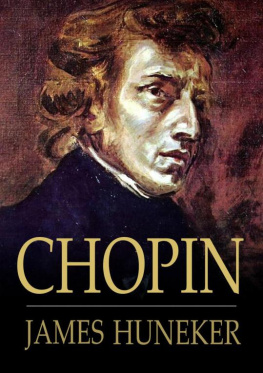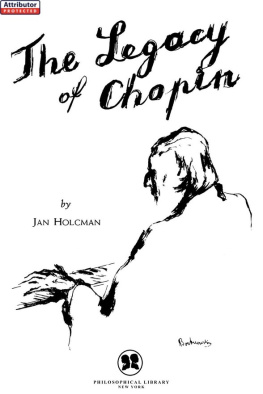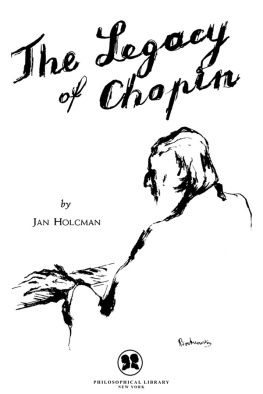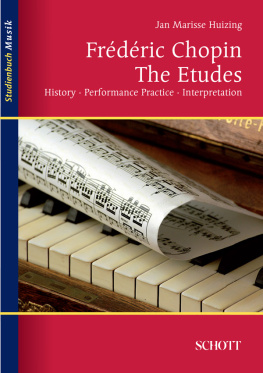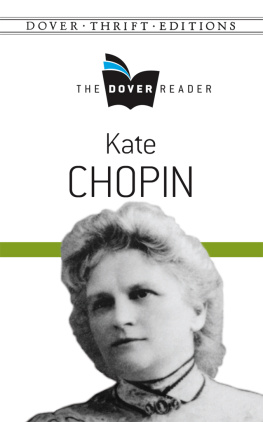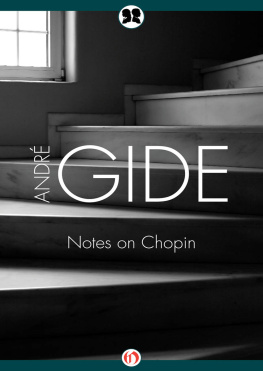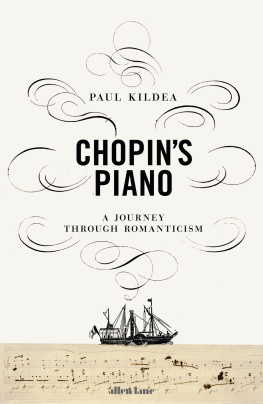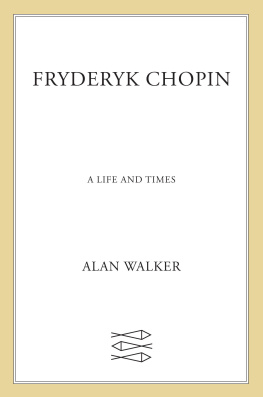coll. - Chopin
Here you can read online coll. - Chopin full text of the book (entire story) in english for free. Download pdf and epub, get meaning, cover and reviews about this ebook. year: 0, genre: Non-fiction. Description of the work, (preface) as well as reviews are available. Best literature library LitArk.com created for fans of good reading and offers a wide selection of genres:
Romance novel
Science fiction
Adventure
Detective
Science
History
Home and family
Prose
Art
Politics
Computer
Non-fiction
Religion
Business
Children
Humor
Choose a favorite category and find really read worthwhile books. Enjoy immersion in the world of imagination, feel the emotions of the characters or learn something new for yourself, make an fascinating discovery.
- Book:Chopin
- Author:
- Genre:
- Year:0
- Rating:3 / 5
- Favourites:Add to favourites
- Your mark:
- 60
- 1
- 2
- 3
- 4
- 5
Chopin: summary, description and annotation
We offer to read an annotation, description, summary or preface (depends on what the author of the book "Chopin" wrote himself). If you haven't found the necessary information about the book — write in the comments, we will try to find it.
Chopin — read online for free the complete book (whole text) full work
Below is the text of the book, divided by pages. System saving the place of the last page read, allows you to conveniently read the book "Chopin" online for free, without having to search again every time where you left off. Put a bookmark, and you can go to the page where you finished reading at any time.
Font size:
Interval:
Bookmark:
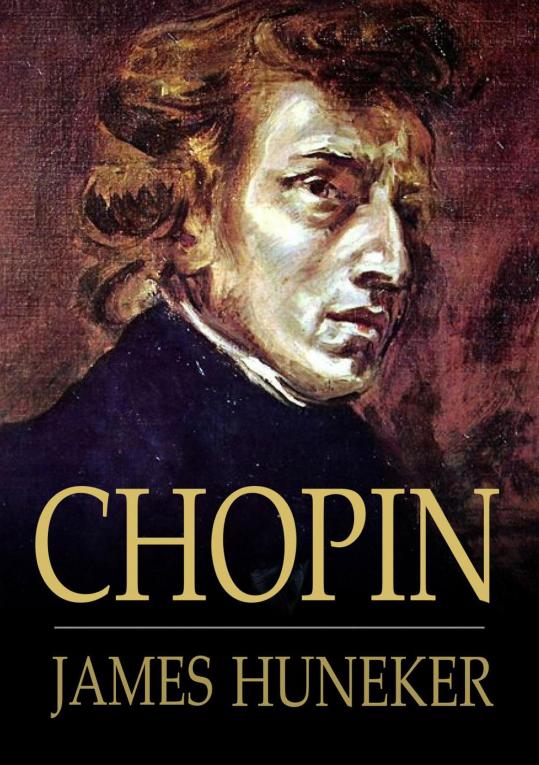

Chopin
The Man and His Music
From a 1900 edition.
ISBN 978-1-775411-52-9
2008 THE FLOATING PRESS.
While every effort has been used to ensure the accuracy and reliability of the information contained in The Floating Press edition of this book, The Floating Press does not assume liability or responsibility for any errors or omissions in this book. The Floating Press does not accept responsibility for loss suffered as a result of reliance upon the accuracy or currency of information contained in this book. Do not use while operating a motor vehicle or heavy equipment. Many suitcases look alike.
Visit www.thefloatingpress.com
Gustave Flaubert, pessimist and master of cadenced lyric prose,urged young writers to lead ascetic lives that in their art theymight be violent. Chopin's violence was psychic, a travailing andgroaning of the spirit; the bright roughness of adventure wasmissing from his quotidian existence. The tragedy was within. Onerecalls Maurice Maeterlinck: "Whereas most of our life is passedfar from blood, cries and swords, and the tears of men havebecome silent, invisible and almost spiritual." Chopin went fromPoland to Francefrom Warsaw to Pariswhere, finally, he wasborne to his grave in Pere la Chaise. He lived, loved and died;and not for him were the perils, prizes and fascinations of ahero's career. He fought his battles within the walls of his soul--we may note and enjoy them in his music. His outward state wasnot niggardly of incident though his inner life was richer,nourished as it was in the silence and the profound unrest of abeing that irritably resented every intrusion. There were eventsthat left ineradicable impressions upon his nature, upon hiswork: his early love, his sorrow at parting from parents andhome, the shock of the Warsaw revolt, his passion for GeorgeSand, the death of his father and of his friend Matuszynski, andthe rupture with Madame Sandthese were crises of his history.All else was but an indeterminate factor in the scheme of hisearthly sojourn. Chopin though not an anchorite resembledFlaubert, being both proud and timid; he led a detached life,hence his art was bold and violent. Unlike Liszt he seldom soughtthe glamor of the theatre, and was never in such public view ashis maternal admirer, Sand. He was Frederic Francois Chopin,composer, teacher of piano and a lyric genius of the highestrange.
Recently the date of his birth has been again discussed byNatalie Janotha, the Polish pianist. Chopin was born in Zelazowa-Wola, six miles from Warsaw, March 1, 1809. This place issometimes spelled Jeliasovaya-Volia. The medallion made for thetomb by Clesingerthe son-in-law of George Sandand the watchgiven by the singer Catalan! in 1820 with the inscription "Donnepar Madame Catalan! a Frederic Chopin, age de dix ans," haveincited a conflict of authorities. Karasowski was informed byChopin's sister that the correct year of his birth was 1809, andSzulc, Sowinski and Niecks agree with him. Szulc asserts that thememorial in the Holy Cross Church, Warsawwhere Chopin's heartis preservedbears the date March 2, 1809. Chopin, so Henry T.Finck declares, was twenty-two years of age when he wrote to histeacher Elsner in 1831. Liszt told Niecks in 1878 that Karasowskihad published the correct date in his biography. Now let usconsider Janotha's arguments. According to her evidence thecomposer's natal day was February 22, 1810 and his christeningoccurred April 28 of the same year. The following baptismalcertificate, originally in Latin and translated by Finck, isadduced. It is said to be from the church in which Chopin waschristened: "I, the above, have performed the ceremony ofbaptizing in water a boy with the double name Frederic Francois,on the 22d day of February, son of the musicians Nicolai Choppen,a Frenchman, and Justina de Krzyzanowska his legal spouse. God-parents: the musicians Franciscus Grembeki and Donna AnnaSkarbekowa, Countess of Zelazowa-Wola." The wrong date waschiselled upon the monument unveiled October 14, 1894, atChopin's birthplaceerected practically through the efforts ofMilia Balakireff the Russian composer. Janotha, whose fatherfounded the Warsaw Conservatory, informed Finck that the laterdate has also been put on other monuments in Poland.
Now Chopin's father was not a musician, neither was his mother. Icannot trace Grembeki, but we know that the Countess Skarbek,mother of Chopin's namesake, was not a musician; however, thetitle "musician" in the baptismal certificate may have signifiedsomething eulogistic at that time. Besides, the Polish clergy wasnot a particularly accurate class. But Janotha has moretestimony: in her controversy with me in 1896 she quoted FatherBielawski, the present cure of Brochow parish church of Zelazowa-Wola; this reverend person consulted records and gave as hisopinion that 1810 is authentic. Nevertheless, the biography ofWojcicki and the statement of the Chopin family contradict him.And so the case stands. Janotha continues firm in her beliefalthough authorities do not justify her position.
All this petty pother arose since Niecks' comprehensive biographyappeared. So sure was he of his facts that he disposed of thepseudo-date in one footnote. Perhaps the composer was to blame;artists, male as well as female, have been known to makethemselves younger in years by conveniently forgetting theirbirthdate, or by attributing the error to carelessness in theregistry of dates. Surely the Chopin family could not have beenmistaken in such an important matter! Regarding Chopin's ancestrythere is still a moiety of doubt. His father was born August 17,1770the same year as Beethovenat Nancy, Lorraine. Some claimthat he had Polish blood in his veins. Szulc claims that he wasthe natural son of a Polish nobleman, who followed King StanislasLeszcinski to Lorraine, dropping the Szopen, or Szop, for themore Gallic Chopin. When Frederic went to Paris, he in turnchanged the name from Szopen to Chopin, which is common inFrance.
Chopin's father emigrated to Warsaw in 1787enticed by the offerof a compatriot there in the tobacco businessand was thetraditional Frenchman of his time, well-bred, agreeable and morethan usually cultivated.
He joined the national guard during the Kosciuszko revolution in1794. When business stagnated he was forced to teach in thefamily of the Leszynskis; Mary of that name, one of his pupils,being beloved by Napoleon I. became the mother of Count Walewski,a minister of the second French empire. Drifting to Zelazowa-Wola, Nicholas Chopin lived in the house of the Countess Skarbek,acting as tutor to her son, Frederic. There he made theacquaintance of Justina Krzyzanowska, born of "poor but nobleparents." He married her in 1806 and she bore him four children:three girls, and the boy Frederic Francois.
With a refined, scholarly French father, Polish in politicalsentiments, and an admirable Polish mother, patriotic to theextreme, Frederic grew to be an intelligent, vivacious, home-loving lad. Never a hearty boy but never very delicate, he seemedto escape most of the disagreeable ills of childhood. Themoonstruck, pale, sentimental calf of many biographers, he neverwas. Strong evidence exists that he was merry, pleasure-lovingand fond of practical jokes. While his father was never rich, thefamily after the removal to Warsaw lived at ease. The country wasprosperous and Chopin the elder became a professor in the WarsawLyceum. His children were brought up in an atmosphere of charmingsimplicity, love and refinement. The mother was an ideal mother,and, as George Sand declared, Chopin's "only love." But, as weshall discover later, Lelia was ever jealousjealous even ofChopin's past. His sisters were gifted, gentle and disposed topet him. Niecks has killed all the pretty fairy tales of hispoverty and suffering.
Font size:
Interval:
Bookmark:
Similar books «Chopin»
Look at similar books to Chopin. We have selected literature similar in name and meaning in the hope of providing readers with more options to find new, interesting, not yet read works.
Discussion, reviews of the book Chopin and just readers' own opinions. Leave your comments, write what you think about the work, its meaning or the main characters. Specify what exactly you liked and what you didn't like, and why you think so.

